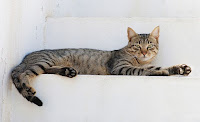 |
| Maybe after my nap..... |
 |
| Anything I can do for you?? |
Another interesting poll reported by focused on the intensity of people's feeling toward dogs and cats. The results showed that 74% of the respondents said they liked dogs "a lot," whereas only 41% said the same of cats. You'll note that the two percentages add to more than 100, meaning that there are some people who have a strong liking for both animals, but not many. Dogs and cats also stimulate negative feelings to different degrees. The same survey asked the respondents whether they disliked each type of animal "a lot." Only 2% said they disliked dogs, but 15% said that of cats. My guess is that cats really don't care. Dogs on the other hand have that genetically programmed plaintive look designed to soften up even the 2% who reject them -- you know, head down on paws, big sad eyes looking up expectantly, often with an audible sigh....
The differences in preferences and feelings toward dogs and cats are undoubtedly tied to the ways each species behaves toward humans, with those behaviors rooted in the nature of the animal and how they each were domesticated. According to Stanley Coren:
"In the wild, cats are usually solitary hunters and often are active mostly at night. In contrast, wild canines are usually sociable pack animals that work in groups and are active between dawn and dusk. Our domestic dogs retain this need for social interaction to the degree that without a master and a family, a dog seems unhappy--almost lost. Dogs will intrude on a person's ongoing activities if they are feeling lonely and want some company or play. Cats, on the other hand, are often invisible during the day, seeming only to appear in the evening, especially if that is when they are fed. Cats will occasionally engage in social activities or play with people, but their interest is limited." (Coren, 2010)Because of the innate social nature of dogs they have been more intensely domesticated than cats, and the traits we find attractive have been intentionally encouraged. The independent and solitary nature of cats, however, led to a different quality of domestication. As the BBC's Henry Nichols recently put it,
"We might expect that the process of domestication would root out that spirited independence. But cats were not domesticated in the same way as other animals, with humans carefully choosing which ones to breed from and which traits to encourage. Instead, cats were probably responsible for their own domestication. (Nicholls, 2015)When cats first encountered human settlements, their wariness and instinct for self-preservation served them well. Sensing opportunity, they were drawn into an urban niche by an abundance of easy prey and an absence of big predators. As quoted by Nicholls, geneticist Carlos Driscoll at the National Institute on Alcohol Abuse and Alcoholism notes that "All these animals had to do was become behaviorally adept at living with people" But importantly, "there was no selection against them hunting, or against them finding their own mates, or against them finding places to build their own nests in a rubbish heap."
The dramatically different behaviors of dogs and cats toward humans may make them attractive to different kinds of people, an idea that has been verified scientifically. The large scale study by Gosling et al, (2010) described earlier included a widely used and highly regarded measure of the major dimensions of personality, and the differences between the respondents identifying as dog versus cat people were assessed. I should note before telling you the results that a danger in presenting personality differences between groups of people on measures like these is that the differences are often over-generalized -- it is incorrectly assumed that everyone in Group A is higher or lower on dimension X than those in Group B. Not true. It's better to think of the differences in terms of trends, or tendencies.
Gosling et al. found that dog lovers were higher than cat lovers on the personality dimensions of Extraversion, Agreeableness, and Conscientiousness. Cat Lovers, on the other hand, were higher than Dog Lovers on the dimensions of Openness and Neuroticism. Similar patterns have been found by Coren, (2010), who notes that the Openness dimension "involves a general appreciation for art, emotion, adventure, unusual ideas, imagination, curiosity, and variety of experience. People high on openness are more likely to hold unconventional beliefs while people with low scores on openness (dog people) tend to have more conventional, traditional interests." This, along with cat people's higher neuroticism, suggests quirkiness and aloofness, both of which fit nicely with my thesis in the following admittedly convoluted way: It's harder to tell on the surface a person is a cat lover, and so when you do find out they like cats you are likely to be surprised -- and pleased, if you are a fellow cat fancier. This common bond may transcend (or at least weaken) the existing social barriers between you, thus contributing to the unification of the world. Peace, harmony and utopian happiness are sure to follow. (Ouch, I think I sprained my brain on that last one.)
My final piece of evidence is the surprising range of people who are cat people, covering a wide spectrum of political, religious, and cultural orientations. Consider these examples from a list of 45 Famous Cat Lovers compiled by Rachael Mulliss: Mohammed...Cardinal Richelieu...Kim Kardashian...Sir Winston Churchill...Abraham Lincoln...Mark Twain...and Ricky Gervais. If there is any common ground among these folks then maybe there is still hope for the world...
I rest my case.
_________
Sources & Resources:
Gosling, S. D., Sandy, C. J., & Potter, J. (2010). Personalities of self-identified “dog people” and “cat people.” Anthrozoös, 23, 213-222.
Stanley Coren, 2010: Psychology Today. Personality Differences Between Dog and Cat Owners.
Henry Nicholls, BBC.Com, 2015: Cats are Utterly, Irredeemably Selfish: True or False?
45 Famous Cat Lovers: Rachael Mulliss.
